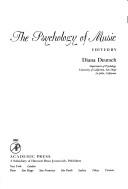| Listing 1 - 3 of 3 |
Sort by
|

ISBN: 0122135601 0122135628 1322316635 1483292738 Year: 1982 Publisher: New York (N.Y.) : Academic press,
Abstract | Keywords | Export | Availability | Bookmark
 Loading...
Loading...Choose an application
- Reference Manager
- EndNote
- RefWorks (Direct export to RefWorks)
Music --- Musique --- Psychology --- Psychologie --- 159.9:7 --- -Art music --- Art music, Western --- Classical music --- Musical compositions --- Musical works --- Serious music --- Western art music --- Western music (Western countries) --- Psychologie van de kunst --- Psychological aspects --- Psychological aspects. --- -Psychologie van de kunst --- 159.9:7 Psychologie van de kunst --- -159.9:7 Psychologie van de kunst --- Art music --- Music psychology --- Muziekpsychologie --- Akoestiek --- Absoluut gehoor --- Gehoortraining --- Sociologie
Multi
ISBN: 9780123814616 0123814618 9780123814609 012381460X Year: 2012 Publisher: [Place of publication not identified] Academic Press
Abstract | Keywords | Export | Availability | Bookmark
 Loading...
Loading...Choose an application
- Reference Manager
- EndNote
- RefWorks (Direct export to RefWorks)
This third edition of 'The Psychology of Music' has been completely revised to bring the reader the most up-to-date information, additional subject matter, and new contributors.
Book
ISBN: 9780190206833 Year: 2019 Publisher: Oxford : Oxford University Press,
Abstract | Keywords | Export | Availability | Bookmark
 Loading...
Loading...Choose an application
- Reference Manager
- EndNote
- RefWorks (Direct export to RefWorks)
In this groundbreaking synthesis of art and science, Diana Deutsch, one of the world's leading experts on the psychology of music, shows how illusions of music and speech - many of which she discovered - have fundamentally altered thinking about the brain. These astonishing illusions show that people can differ strikingly in how they hear musical patterns - differences that reflect both variations in brain organization and influences of language on music perception. They lead Deutsch to examine questions such as: When an orchestra performs a symphony, what is the 'real' music? Is it in the mind of the composer, or the conductor, or different members of the audience? Deutsch also explores extremes of musical ability, and other rare responses to music and speech. Why is perfect pitch so rare? Why are some people unable to recognize simple tunes? Why do some people hallucinate music or speech? Why do we hear phantom words and phrases? Why are most people subject to stuck tunes, or 'earworms'? Why do we hear a spoken phrase as sung just because it is presented repeatedly? In evaluating these questions, she also shows how music and speech are intertwined, and argues that they stem from an early form of communication that had elements of both. Many of the illusions described here are so striking and paradoxical that you need to hear them to believe them. So the book enables you to listen to the sounds that are described while reading about them.
Perception de la musique. --- Music --- Musical perception --- Psychological aspects
| Listing 1 - 3 of 3 |
Sort by
|

 Search
Search Feedback
Feedback About UniCat
About UniCat  Help
Help News
News